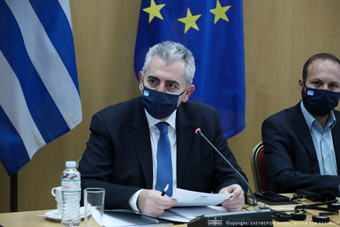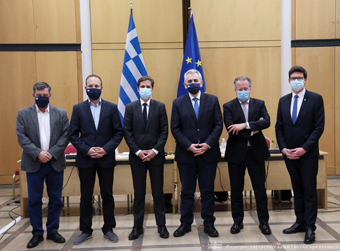Press Office
Athens, 2 June 2021
Exchange of views between Greek MPs and French counterparts on New Pact on Migration and Asylum

A Hellenic Parliament delegation consisting of the Chairman of the Permanent Committee on Public Administration, Public Order and Justice Maximos Charakopoulos and the Committee members Giorgos Koumoutsakos, Giorgos Psychogios and Georgios Kaminis met today with French MPs Pierre Henri Dumont and Pieyre-Alexander Anglade (LaREM), members of the European Affairs Committee of the French National Assembly, in order to exchange views on developments in the negotiations on the New Pact on Migration and Asylum.
The head of the Greek delegation, Mr. Charakopoulos, stated, inter alia, that the New Pact on Migration and Asylum can play a positive role, which will cover the basic principles of humanism governing the EU, but also the principle of solidarity. For this reason, he argued, the following four principles must be clearly stated in it: a) mandatory solidarity between states, while relocation should be based on population criteria and there should be specific measures-sanctions in case of non-compliance, b) control for those wishing to enter EU territory should be done before entering, at designated points, where those wishing to request asylum may do so, c) Europe should have agreements on returns with third countries, based on the “more for more and less for less” principle and, d) there should be a provision that a member state may unilaterally declare a state of emergency, especially for reasons of national security. 
Mr. Koumoutsakos stressed, inter alia, that the migration will be a long-lasting phenomenon, as it constitutes a permanent social, political, economic and cultural challenge, both for Greece and Europe, which affects the backbone of the Union’s fundamental values. He argued that Greece wishes there to be a comprehensive, cohesive European policy on migration, but not at any cost for frontline countries. Referring to the country’s negotiating line on the New Pact he noted that it is based on the principle that nothing can be mandatory unless everything is mandatory for all EU member states. Lastly, he stressed the need to create a migration crisis mechanism, which will be automatically activated for the timely and effective management of emergencies.
Mr. Psychogios, for his part, argued, inter alia, that we cannot continue to witness the accumulation of all asylum petitions in the countries of first reception, but that the Pact must serve the rationale of a stable mandatory relocation mechanism, with no voluntary or selective solidarity. He called the New Pact a plan for a “Europe of few, closed like an oyster”, even though its fundamental values and principles that led to growth, social cohesion and quality of life in the last decades were different. Furthermore, he stressed that, at present, only 0,6% of the EU’s population are refugees, so they do not have much impact on it, while in countries such as Lebanon they constitute up to 30% of the population.
And lastly, Mr. Kaminis argued that the New Pact did not manage to strike a balance between solidarity and responsibility sharing among EU member states, as it is still a field of intense confrontations and negotiations between member states of the EU, to the point that its very foundation is being tested. He underlined the need for active support from Visegrad countries in the field of hosting migrants, while on the issue of xenophobia he noted that it will increase as long as migrant flows continue unabated.
High resolution images
Back